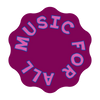Do It Yourself: Starting Over [Brainstorming]
We're documenting ideas, research and processes as we help Joseph Arthur start releasing music again. Using Mailchimp + Bandcamp
![Do It Yourself: Starting Over [Brainstorming]](/content/images/size/w2000/2022/09/joseph_MFA_1_alt.png)
We're pleased to begin working with the extremely talented visual artist and singer songwriter Joseph Arthur.
We first spoke with Joseph back in March, when he was kind enough to invite us onto his radio show, where we discussed the Music For All project. He has been enthusiastic about our plans to provide more music industry tutorials and relevant documentation to help independent artists.
Joseph was abruptly dropped by his management, booking agent and other collaborators in 2021. We're brainstorming a good place to start rebuilding. He has new music he's excited to release, and an extensive discography.

We strongly believe an artist should never have to make compromises with regards to personal autonomy or freedom of expression, and this often means doing more things yourself.
We're starting from scratch with a fresh perspective, learning what aspects of the existing music industry we can use to our advantage and what we should re-think. We will document our progress every week.
Below are some of the topics we discussed, along with some relevant advice, as part of an initial brainstorming call.
Who Has The Digital Masters?
Many of the smaller independent labels I've worked with struggle with keeping a well organized digital archive of the music they release, with few notable exceptions.
If you are an independent artist and don't know where to start, or haven't been staying organized, don't feel bad because no one seems to be doing this well. It's a chaotic disorganized mess. Even at the majors.

I always found this disappointing, since the record label was presumably responsible for protecting the artist's music first and foremost. Yet from my experience, digital audio archiving or any amount of organization of audio was frequently neglected, especially with the rise of streaming. From what I can tell, much of this has been outsourced to distributors or other third parties helping with digital distribution.
If you are lacking information on any of your releases, a good place to start would be Discogs.

Where many record labels have failed, Discogs has kept an impressive database of music metadata. You can typically find out who mastered an album this way, and then reach out to the mastering house to see if they still have the audio.
MusicBrainz is also a good resource.
Do You Have An Email List?
Did your past label, booking agent or management have a targeted email list of fans who purchased your music or signed up for your newsletter? They might charge you for it, or be mean to you, but it's at least worth asking! UPDATE: This worked.
If not, starting one is a great way to keep in touch with fans directly, especially with increasing concerns about censorship on social media platforms. Try to find or build upon an existing list — start collecting some emails!
Mailchimp is easy to use and pretty intuitive, it also has a free tier you can use to get started.
We're not entirely sure how easy it is to get thrown off of. We'll probably find out at some point. Ideally we'd recommend using open source software that is easy to use and also shares our same values with regards to free speech — I'm still researching options here.
In the meantime, if you do use Mailchimp and are saying controversial things on the world wide web, make sure to keep your lists backed up elsewhere for good measure.

Mailchimp integrates sign up forms easily with other websites, such as WordPress, so you can add an email sign up to your existing site.

Do You Have Existing Physical or Digital Products To Sell?
Bandcamp is an easy way to add your digital and physical albums up for sale quickly if you do not have your own webstore.
They also have a feature which allows fans to purchase your albums for more than the listed price.

Do you need help setting up your music on Bandcamp, or have any advice you'd like to share? Email us!







